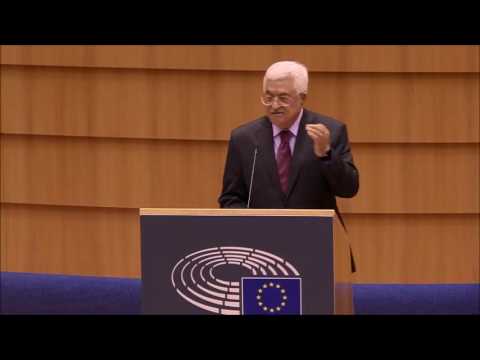Evoking one of the more lethal medieval antisemitic libels, PA President Mahmoud Abbas, while addressing the European Parliament, accused Israeli rabbis of calling for their government to literally poison Palestinian wells.
The incendiary accusation, debunked by the blog Israellycool (with follow-up research by CAMERA senior researcher Gidon Shaviv), was so fundamentally antisemitic that even several voices known for their egregious hostility towards Israel condemned Abbas.
The New York Times, in a story by Diaa Hadid, characterized Abbas’s speech as one which “echo[ed] anti-Semitic claims that led to the mass killings of European Jews”. The story was also covered by Reuters, AFP, Haaretz and The Washington Post in reports which were similarly contextualized by citing the similarity of Abbas’s claim with historic antisemitic libels.
Yet, major British media outlets – including the Guardian, Independent, Telegraph and Times of London – have, thus far, completely ignored the story.
As a quick contrast in coverage, all these publications reported on comments by Binyamin Netanyahu, widely characterized as racist, in which he warned on the eve of his 2015 re-election that Arabs were voting in “droves”.
However, this is more than merely an example of selective reporting.
The omission represents a larger pattern within the British media whereby even the most extreme manifestations of Palestinian Judeophobia fail to pique the interest of putatively anti-racist news editors. Their tendency to bury news painting an unflattering picture of Palestinians was illustrated by the dearth of stories on the results of a 2014 survey commissioned by ADL which showed that Palestinians are the most antisemitic group in the world.
Here are some highlights from ADL’s survey:
- 88% of Palestinians believe Jews have too much control over global affairs.
- 89% believe Jews have too much power over international financial markets
- 88% of Palestinians believe that Jews have too much control over the global media
- 78% of Palestinians believe that Jews are responsible for most of the world’s wars.
- 87% of Palestinians believe that people hate Jews because of the way Jews behave.
And, herein lies the point: Abbas’s comments (which he later retracted, presumably to quell criticism) can only be properly understood as a reflection of the prevalence and acceptance of such irrational, racist views within Palestinian society.
Walter Russell Mead has argued persuasively that such a malign obsession with Jews does grave harm to Palestinians. “Attributing global events to the machinations of an all-conquering Jewish conspiracy”, explained Mead, “is the sign of profound mental and social failure – and a harbinger of more failures and errors to come.” Societies, he added, that are “in thrall to this kind of darkness…and whose intellectual leaders cannot understand how power works in the modern world…are unlikely to develop the vigorous, forward-looking and competent civil societies that can promote true democracy.”
Palestinian antisemitism is one of the more under-reported political pathologies within the region, and the failure of journalists, analysts and editors to deal honestly with the injurious impact of this enduring hatred contributes to the British public’s misunderstanding of both the root cause of the conflict and a regressive political culture within Palestinian society.
Related Articles:





